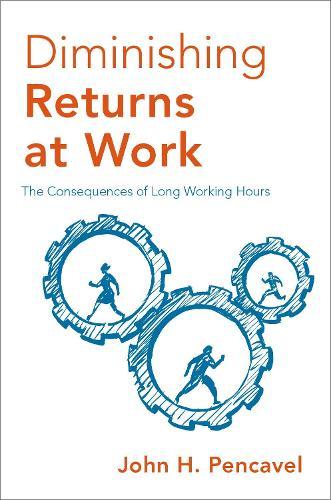Awards
- Winner of Awarded the 2018 Richard A. Lester Award for the Outstanding Book in Industrial Relations and Labor Economics.
Overview
The relationship between the number of hours worked and productivity has long fascinated economists and management. It is a central component of the production function that translates inputs to outputs. While increasing the number of hours someone works may increase output, this incisive book demonstrates that there are diminishing returns to long working hours.John H. Pencavel provides an overview of how the length of working hours evolved from the 19th century to today and how the number of working hours affects work performance and other outcomes, including health, well-being, and wages. Diminishing Returns at Work provides a brief history of working hours both in the United States and Britain, including the influence of trade unions pushing for shorter hours of work, the tension with employers who resisted reducing hours, and the influence of legislation and custom. Pencavel discusses various conceptual frameworks for specifying production functions that measure the relationship between inputs and outputs and develops an alternative approach to estimate actual relationships through a reevaluation of classic studies, including the productivity of munitions workers in Britain during the First and Second World Wars and plywood mills in Washington during the 1980s among others. The declining effectiveness of long hours is manifested not only in marketable output but also in a rising probability of ill-health and accidents, and evidence of this has been found both for blue-collar workers and for white-collar workers. In short, shorter hours of work might benefit both firms and workers.
Full Product Details
Author: John H. Pencavel (Pauline K. Levin-Robert L. Levin and Pauline C. Levin-Abraham Levin Professor, Pauline K. Levin-Robert L. Levin and Pauline C. Levin-Abraham Levin Professor, Stanford University)
Publisher: Oxford University Press Inc
Imprint: Oxford University Press Inc
Dimensions:
Width: 13.70cm
, Height: 2.80cm
, Length: 21.10cm
Weight: 0.399kg
ISBN: 9780190876166
ISBN 10: 0190876166
Pages: 268
Publication Date: 12 July 2018
Audience:
Professional and scholarly
,
Professional & Vocational
Format: Hardback
Publisher's Status: Active
Availability: Manufactured on demand

We will order this item for you from a manufactured on demand supplier.
Reviews
John Pencavel provides a lively and comprehensive analysis of what economists have learned about the nature and extent of diminishing returns to work hours. Although there are undoubtedly diminishing returns in many work activities, as Professor Pencavel expertly demonstrates, readers will not experience diminishing returns from their time spent reading this enlightening book! - Alan B. Krueger, Bendheim Professor of Economics and Public Affairs, Princeton University Diminishing Returns at Work is a valuable contribution to the economics of work hours. Pencavel highlights the theoretical and empirical aspects of First and Second World War productivity data and provides an extensive historical account of how working hours evolved. - Dora Costa, Professor of Economics, UCLA With his lucid writing and careful empirical research John Pencavel has established the proposition that is the title of this book: extra hours at work increase output, but at a decreasing rate. The implications of this finding are profound: reduced worker hours are easier to justify than many employers think, and experiments to measure this relation may have an invaluable payoff. This is a book that should stimulate both economists and employers to re-think the way they treat working hours in their models and in the world. - Orley Ashenfelter, Joseph Douglas Green 1895 Professor of Economics, Princeton University
John Pencavel provides a lively and comprehensive analysis of what economists have learned about the nature and extent of diminishing returns to work hours. Although there are undoubtedly diminishing returns in many work activities, as Professor Pencavel expertly demonstrates, readers will not experience diminishing returns from their time spent reading this enlightening book! - Alan B. Krueger, Bendheim Professor of Economics and Public Affairs, Princeton University Diminishing Returns at Work is a valuable contribution to the economics of work hours. Pencavel highlights the theoretical and empirical aspects of First and Second World War productivity data and provides an extensive historical account of how working hours evolved. - Dora Costa, Professor of Economics, UCLA With his lucid writing and careful empirical research John Pencavel has established the proposition that is the title of this book: extra hours at work increase output, but at a decreasing rate. The implications of this finding are profound: reduced worker hours are easier to justify than many employers think, and experiments to measure this relation may have an invaluable payoff. This is a book that should stimulate both economists and employers to re-think the way they treat working hours in their models and in the world. - Orley Ashenfelter, Joseph Douglas Green 1895 Professor of Economics, Princeton University
Author Information
John H. Pencavel is the Levin Professor of Economics-Emeritus, Stanford University.




